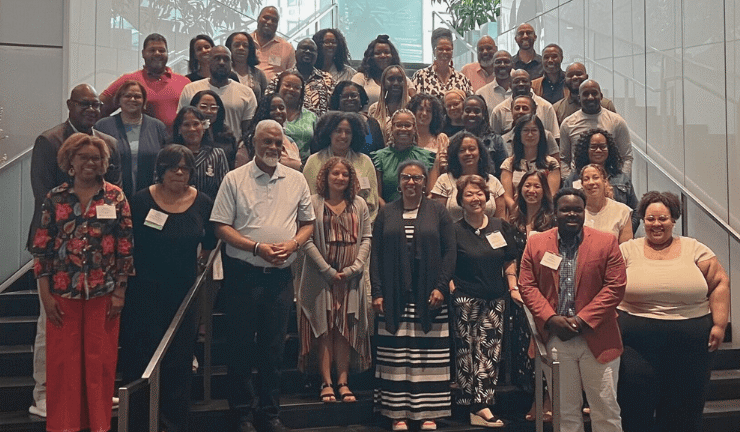An Empty Chair at the Catholic School Table

by Kent Hickey and Rob Birdsell
Introduction
Clergy and religious have been the leaders of Catholic schools in our country throughout most of their long history. What that meant in years’ past was that most Catholic schools were led by those who received both extensive spiritual formation prior to entering the position and ongoing spiritual direction while serving in it. The same is not true today, and that is a significant problem for Catholic schools and their leaders.
Today, over 90% of Catholic schools are led by laypeople. Like their clergy and religious predecessors, the training lay leaders receive prior to becoming school heads is uneven at best, one reason so many are ill prepared for the expansive responsibilities that come with the position. But at least clergy and religious school leaders had the benefit of spiritual formation and ongoing direction. Lay leaders generally lack even this, and that must change if lay Catholic school heads and their institutions are to thrive.
Here is what that change could look like: First, training for Catholic school leadership needs to reflect what the job really is – Chief Executive Officer of the school. While an advanced degree in curriculum and instruction or the like may be helpful, it is inadequate without additional training in the “business” side of the school. This training should also include preparation for the most important part of the job: spiritual leadership. The modern Catholic school head is a Spiritual CEO – preparation for that role should reflect this reality.
Second, Catholic school lay leaders should cultivate a vibrant interior life once they have taken on a Spiritual CEO position. This should include developing consistent prayer practices while being accompanied by a spiritual director, a wise companion who could reinforce those practices and provide ongoing support. It should also include opportunities for immersion in community within the broader Catholic ecosystem, leveraging the strength of our relationships. Catholic school leadership can be a difficult journey, and this requires spiritual nourishment from multiple sources every step of the way.
The Hardest Job You’ll Ever (Sometimes) Love
Our work over the years has blessed each of us with opportunities to establish relationships with Catholic school heads from across the country. Characteristics shared among these colleagues include fervent desire to serve, genuine care for the people at the schools they lead, sense of humor, humility, self-awareness, and unwavering commitment to mission.
Also common among these leaders, however, is sometimes feeling overwhelmed by the many demands of the job, disconnect between mission-based aspirations and lived reality, desolation in times of failure and frayed relationships, and the isolation that comes with being the “buck stops here” person in the organization. Those difficulties were exacerbated during the pandemic. Suddenly, decisions involved life-or-death questions and each day brought with it a confluence of shifting public health guidance, concerns for vulnerable faculty, struggles to meet student needs, and waves of opinions about what should be done.
But the pandemic, as hard as it was, represented only an increase in degree of difficulty. The job had become exceedingly difficult even before the pandemic, and it remains so today: pressure to raise enough revenue to meet ever-increasing expenses; annual enrollment anxieties; toxicity that can permeate a faculty room; challenges from alumni (“you’re not Catholic enough!”); doing too much or too little with Diversity, Equity, Inclusion & Belonging; disconnect with board members who are driven more by personal agenda than mission. In sum, it’s often not so fun.
The consequences are predictable. As search firms will openly share, there is currently a significant shortage of qualified candidates to fill Catholic school leadership openings. Word is out– this is a hard job, perhaps too hard. And the openings just keep multiplying. Exceptional leaders, including many younger ones who are just starting their careers, jump out of the pressure cooker almost immediately after getting in.
We both belong, for example, to the Institute for Leadership and Entrepreneurship in Education (ILEE), an organization for Catholic school leaders from across the country that provides a forum to share best practices and develop professional relationships. Established in 2019, of the 21 leaders involved in ILEE over the past four years, only 11 remain in the same position and six have left the profession altogether. Without a meaningful change in preparation for Catholic school leadership and an ongoing commitment to provide spiritual nourishment to Catholic school leaders, the downward spiral will continue.
Spiritual CEO Formation
Two changes could redirect that downward spiral into an upward trajectory. The first would be to ensure that future Catholic school leaders are prepared to serve as Chief Executive Officers by matching formal training with the job responsibilities. This is best accomplished through education programs that emphasize CEO-centered coursework: operational excellence, advancement, communications, human resources, governance, finance, and facilities management.
Thankfully, CEO-centered leadership programs of this type are emerging at a few Catholic universities. However, exposure to the nuts and bolts of the job is insufficient without an introduction to spiritual leadership, including pastoral care practices, varied methods of prayer, and an understanding of the rich mosaic of Catholic faith traditions. A lay leader who directs a spiritual work cannot lead that work without a grounding in spiritual practices and faith leadership. Nor should lay leaders abdicate spiritual leadership to a local pastor or chaplain. The Catholic school head is a Spiritual CEO and preparation should reflect this reality.
Ongoing Spiritual Nourishment
Formal Spiritual CEO preparation, however, is just the start. Given the many demands of the job, the second change required is more opportunities for ongoing formation in the form of ever-deepening prayer practices, ongoing spiritual direction, and healthy, life-giving relationships within the Catholic leadership ecosystem. Teilhard de Chardin said, “We are not human beings having a spiritual experience. We are spiritual beings having a human experience.” This is very much true for those who serve as Catholic school leaders. They are spiritual beings having a challenging, very human leadership experience. Only by developing a vibrant spiritual life both interiorly and within community can these good people receive the nourishment they need to thrive as Catholic school leaders.
Prayer
Many school leaders say they simply do not have time in their day for prayer. In response to a similar challenge, when someone told Pope Francis they didn’t have 30 minutes a day for prayer, he said, “Well, you should then do an hour.” What this daily prayer may look like could be as diverse as the multitude of Catholic school leaders in this country. For some that daily prayer might be a quiet morning walk in nature, each day accompanied by the awe that comes with God’s creation. Others may use one of many apps to guide their prayer like Pray as You Go or Centering Prayer. Those who want to go old school might pray the Liturgy of the Hours, contemplative prayer nearly as ancient as the Church itself. What is critical is that the leader carves the time out every day and that nothing, even crisis, crowds out daily prayer.
Spiritual Direction
These prayer experiences could then be probed and deepened in regular conversations with a spiritual director, a companion who would accompany the school leader on the journey and help bridge interior prayer life with lived experiences at home and school. Sharing the road with a spiritual companion would help school leaders live in healthier balance and better discern meaning and purpose.
Yet, in a recent survey of 40 Catholic school heads from across the country, only 37% stated that they were receiving regular, formal spiritual direction. Of these, only 5% receive a stipend from their school to pay for spiritual direction. However, 98% of these leaders felt that ongoing spiritual direction would be helpful. And 90% stated that they would participate in spiritual direction of this kind if presented with the opportunity to do so.
Leaders such as Dr. Kristin R. Cully, Director of Inquiry and New Ventures for the Jesuit Schools Network, are pointing the way: “The call to care for our leaders through nurturing their own faith with ongoing spiritual direction is wise and long overdue. Investing time, resources, and energy in cultivating an active faith life of our Catholic school leaders could be the difference in their longevity in furthering the mission of our particular way of education.”
Another excellent leader, Dr. Erin C.O. Barisano, Diocese of Orange (CA) Catholic Schools Superintendent, echoed those thoughts: “Those who are in positions of supporting Catholic school leaders have a profound responsibility to foster a sense of community and ensure there are meaningful opportunities for formation and renewal to sustain Catholic school leaders as spiritual leaders.” In a very practical move, every Catholic school leader’s contract should provide a stipend for spiritual formation and ongoing direction, and that is exactly what Dr. Barisano recently did for three of her school heads.
Community
Finally, in addition to carving out meaningful time for personal prayer and spiritual conversation, it is essential that Catholic school leaders find community with and through each other. The Catholic ecosystem itself should fortify and nourish, and that means meaningful, regular opportunities to gather with one another in prayer, fellowship, professional development, and healthy doses of social time.
We saw the benefits of this first-hand in the ILEE seminars held in the spring of 2019 and 2023. Current and emerging Catholic school leaders from across the country gathered for three days of prayer, networking, lively discussion, professional development, and sitting around a firepit with beverages in hand. This format yielded excellent results: 94% of the participants surveyed stated it was one of their top three experiences and 94% also stated they planned to build on the experience by collaborating with fellow seminar participants going forward.
The results were so encouraging that ILEE is launching cohort-based, three-part seminars for Catholic education leaders: Spiritual Leadership, Contemplative Leadership, and Transformational Leadership. The need and the desire are clear: The first cohort will launch in March 2024 and is already full. Additional cohorts will launch in fall, 2024 and spring, 2025.
Cohort-based leadership experiences fit perfectly with Catholic school culture. Relationships are the Fourth R of Catholic education. One way we help God build the Kingdom – and reduce feelings of isolation and vulnerability in ourselves – is by journeying with each other. A strength our Catholic schools possess that is generally lacking in other school systems is the awesome potential power of the relationships we build in community, a strength needed now more than ever if our schools and their leaders are to thrive.
Conclusion
Catholic school leaders are spiritual beings having a very human experience. As Spiritual CEO, these leaders need greater access to preparation programs through Catholic universities or professional organizations to learn how to master the CEO part of the job.
Even more importantly, these leaders should have ongoing opportunities to live and work as spiritual beings leading very human institutions through personal prayer, access to spiritual direction, and immersion experiences in Spiritual CEO faith communities. God’s creation is ongoing, and school leaders, called to labor with God, are charged with creating more time and bigger spaces for God’s design to unfold. It is through a vibrant interior life and ongoing spiritual conversation that the Spiritual CEO helps God transform our Catholic schools into manifestations of the Kingdom.
Rob Birdsell is the President of Catholic Virtual, host of the podcast the Next Class, Executive Director of the Institute for Leadership and Entrepreneurship in Education (ILEE), Executive Vice President of Amerigo Education, and Senior Advisor to Shorelight Education. He is the past CEO of the Cristo Rey Network and co-founder of the Drexel Fund.
Kent Hickey served at Catholic schools in Chicago, Milwaukee, Seattle, and Bakersfield, CA for 35 years, including 24 years as head of three high schools. He currently serves as Director of Faith Formation at ILEE and was recently named a Senior Consultant at Carney, Sandoe & Associates. Kent is the author of “40 Days with God,” published by Paraclete Press.
Rob and Kent began their careers together at Marquette University High School.








